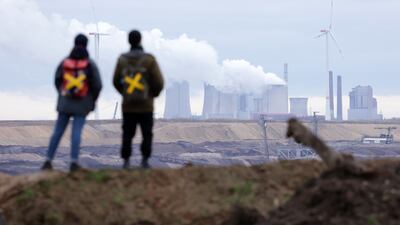The energy landscape in 2023 looks vastly different than it did just a year ago. Russia’s invasion of Ukraine was a geopolitical turning point. In addition to exacting a dire humanitarian toll, the war has shattered hopes for the global energy system’s return to what it was before Covid-19, creating market challenges with far-reaching consequences for 2023 and beyond.
But the war may ultimately accelerate longer-term trends rather than reverse them.
Energy prices are retreating from 2022’s multi-year highs, yet any apparent calm belies a more complicated future. High energy and food prices are stretching household budgets and reversing progress on expanding access to clean power. The International Energy Agency notes that energy poverty is growing for the first time in decades. While Russia’s gas cuts to Europe are raising additional climate challenges as Europe reverts to coal and oil to compensate, a response of desperation from a bloc that prides itself on climate leadership.

Nevertheless, the upsurge in carbon-intensive power appears temporary. It is increasingly clear that national security, energy security and addressing climate change go hand-in-hand. Policymakers worldwide are hastening efforts to decouple their economies from foreign hydrocarbons, providing fresh impetus for decarbonisation.
The EU’s REPowerEU strategy explicitly ties energy independence from Russia with increasing clean power and energy efficiency. Meanwhile, the landmark US climate legislation, the Inflation Reduction Act, creates incentives to create localised and geopolitically secure clean energy supply chains. Hastening climate ambition in the world’s largest economy promises to catalyse massive clean energy investments of global importance.
Unsurprisingly, energy leaders head into 2023 with a greatly revised outlook from 2022, as revealed in the Atlantic Council’s third annual survey of the Global Energy Agenda. The survey, conducted between October and November 2022, drew from the combined knowledge of energy stakeholders from more than 50 countries and represents a wide variety of professions.
Complementing our survey, a diverse group of experts, corporate leaders and policymakers contributed essays that provide deeper insights on topics ranging from critical minerals to advanced nuclear power to climate diplomacy.
Several trends stood out in our survey.
One is that Russia’s war in Ukraine has recalibrated perceptions of geopolitical risk. In the fall 2021 survey – conducted only months before Russia’s invasion – one in four cited cyberattacks as the greatest geopolitical risk facing the energy sector. Conflict involving a major energy producer was the top risk for a mere 17 per cent of respondents, despite mounting concerns that Russia was preparing for war. In our fall 2022 survey, nearly half cited the Russia-Ukraine war as the top risk.
Representing one-tenth of global oil and gas supply in 2020, Russia is a central actor in global energy markets. The war’s effect on energy prices, however, is expected to be temporary, according to respondents. A significant contingent sees oil demand receding within the next decade, explaining why only 23 per cent believe geopolitics will be the primary cause of market volatility come 2030.
Few agree on how to achieve net-zero emissions by 2050, but the number of respondents who believe it will happen is growing rapidly. Although still a minority, 45 per cent of respondents believe net zero is reachable within the next 30 years, a remarkable increase from 27 per cent a year ago, and higher than the 36 per cent from the first Global Energy Agenda in 2021. Counterintuitively, optimism for climate neutrality is most subdued among participants from emission-free sectors; 73 per cent responded it is “unlikely” the world will reach net-zero by 2050, 9 per cent higher than those working in oil and gas.
While respondents widely agree that political will is the primary obstacle to net zero, the costs of financing and infrastructure weigh on those outside Europe and North America. This divide colours views on the overall transition as well, where the Global North sees broad macro-economic trends – recessions or inflation – as the principal headwinds, while developing world respondents also frequently cite a lack of state investment. Addressing inequities in financing the transition will be in focus at Cop28 in the UAE later this year.
The roughly even split between respondents who see a long-term future for gas and those who do not remains consistent year-on-year, but with greater geographic variations. A majority of respondents remain bullish on the role of gas in the future global energy mix. The vast majority of those remaining – some 40 per cent – think it will act as a long-term bridge fuel before disappearing, with only 3 per cent seeing a minimal future role for gas.
Despite Europe’s efforts to secure new sources of gas, Europeans are increasingly skeptical of the fuel. This year, 49 per cent foresee gas playing a permanent role, down from 58 per cent last year. Conversely, in the Mena region, the expectation that gas will remain a permanent fixture of the energy mix is growing, up to 40 per cent from just 30 per cent last year.
The political and economic landscape of 2023 is vastly changed. Although Russia’s invasion of Ukraine has highlighted an apparent re-emergence of the geopolitics of energy, this year’s respondents are increasingly undeterred by near-term volatility.
A year ago, we noted growing ambivalence – even pessimism – on the outlook for a net-zero transition. Then, timelines for peak oil demand and expectations for total decarbonisation were contracting. One might expect that the Ukraine war would amplify doubts about the energy transition. Yet expectations of peak oil demand have steadied, while expectations for net zero are growing.
Despite a year defined by complications in the energy transition, there is hope on the horizon as the global energy community remains focused on the continuation of longer-term energy security and climate goals.


